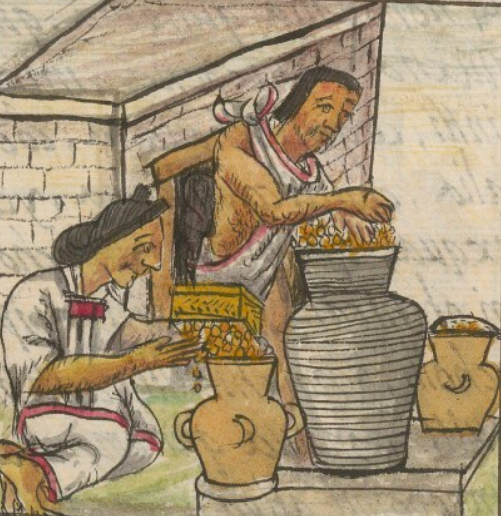comitl (FCbk4f72v)
The example of the iconography of earthenware jugs, such as the comitl, is included here for the purpose of making potential comparisons with glyphs of vessels and providing some context about size and purpose. The term comitl is not glossed, but it is provided by the Digital Florentine Codex team as a relevant keyword here, along with apilolli and apaztli (or ahpaztli, terms for water jugs). This detail shows two handled jugs with a tan color and one larger vessel that is gray with a white border at the top, a neck, and lots of horizontal lines running around the outside. These lines are close together and may suggest something about the way the pot was made. We know from the other images on the source page that these jugs are being used for the storage of amaranth grain (huauhtli). The contextualizing image shows a seated woman and a standing man who are putting the grain into the vessels. The woman holds a small petlatl in the shape of an open box (a chiquihuitl, basket, or a tompiatli/tompiahtli, a small deep basket). Both people wear white clothing with red trim. She has the huipilli (blouse) and cueitl (skirt), he wears a cloak (tilmatli) tied above his right shoulder. She also wears the neaxtlahualli (also called the axtlacuilli) hairstyle so typical of adult women.
Stephanie Wood
The larger, darker vessel somewhat resembles the earthenware cuezcomatl (below), which is usually known for storing maize. The smaller, terracotta-colored vessels look more like the comitl of the Nahuatl hieroglyphs, which sometimes have three visible handles. The comitl will often be found in glyphs where a phonetic -co- or -con- is needed.
Stephanie Wood
1577
Jeff Haskett-Wood
olla, ollas, cerámica, barro, jarra, jarras
com(itl), earthenware vessel, https://nahuatl.wired-humanities.org/content/comitl
la olla
Stephanie Wood
Available at Digital Florentine Codex/Códice Florentino Digital, edited by Kim N. Richter and Alicia Maria Houtrouw, "Book 4: The Soothsayers", fol. 72v, Getty Research Institute, 2023. https://florentinecodex.getty.edu/en/book/4/folio/72v/images/429b9cde-0a... Accessed 29 June 2025.
Images of the digitized Florentine Codex are made available under the following Creative Commons license: CC BY-NC-ND (Attribution-NonCommercial-NoDerivs 4.0 International). For print-publication quality photos, please contact the Biblioteca Medicea Laurenziana ([email protected]). The Library of Congress has also published this manuscript, using the images of the World Digital Library copy. “The Library of Congress is unaware of any copyright or other restrictions in the World Digital Library Collection. Absent any such restrictions, these materials are free to use and reuse.”





